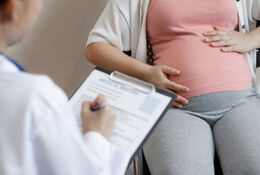Problemas peculiares del embarazo

You’ve probably heard all about morning sickness and swollen ankles. Here are some symptoms of which you may not be aware.
Skin Tags
Skin tags are very small growths the color of your skin. They tend to appear on the underside of your arms beneath your breasts or on your neck. Skin tags are more annoying than indicative of a health problem. Some mothers will see them subside after delivery. If yours hang around and are bothersome, talk to your dermatologist about having them removed.
Varicose Veins
During pregnancy, your body produces more progesterone than usual. This hormone can cause your veins to open wider, which can lead to varicose veins. When you are pregnant your total blood volume increases by about 50 percent. This can also cause your veins to enlarge, potentially resulting in varicose or spider veins.
Ease the pain that may accompany varicose veins by exercising regularly, avoiding high heels and moving around if you have a job that involves sitting or standing in one position for an extended period of time.
Taste Bud Changes
You may have an unpleasant taste in your mouth during pregnancy that doesn’t have anything to do with the food you’re eating. Hormone fluctuations can lead to an altered sense of taste. Some women describe it as a metallic taste, while others complain of bitter or sour tastes. To help, eat a few dry crackers before meals or chew flavored gum (if you have morning sickness, try mint). Spicy foods can also help because of the numbing effect brought about by the capsaicin in peppers.
According to the American Pregnancy Association, as much as 80 percent of pregnant women experience morning sickness. It’s common for pregnant women to experience nausea or food aversions, but for some women the condition is much more serious. Hyperemesis gravidarum resembles morning sickness, but nausea and vomiting are severe and often lead to concerning weight loss and electrolyte imbalance.
Signs that you may be experiencing hyperemesis gravidarum include:
- confusion or fainting
- headaches
- jaundice
- low blood pressure
- nausea that doesn’t subside after 12 weeks and/or is accompanied by severe vomiting
- rapid heart rate
- severe dehydration
Women with the condition may need to stay overnight in the hospital to receive intravenous fluids. Bed rest and acupressure may also help. If you exhibit any of these symptoms, talk to your doctor rather than trying to treat them with over-the-counter medication.